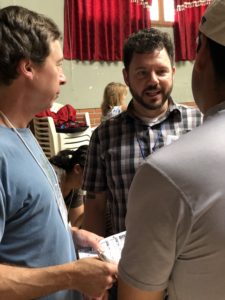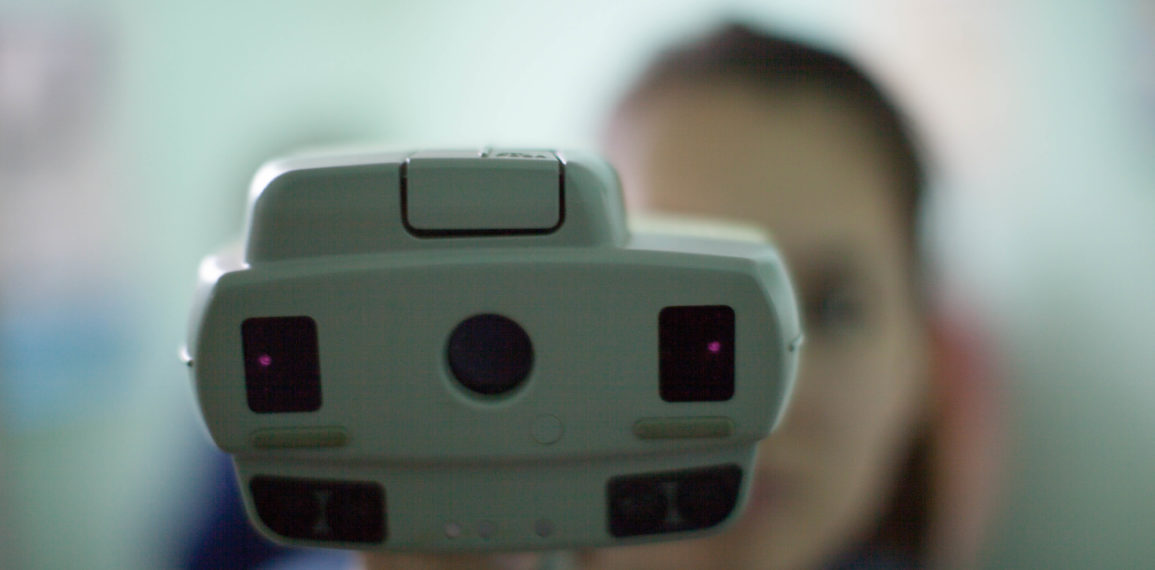Dr. Ciszek graduated cum laude from Augustana College in Rock Island, Illinois, as a triple major in biology, pre-med, and Spanish. Combining his interests, he spent several months studying in Arequipa, Peru at the Universidad Catolica de Santa Maria. Later, he went on to the Illinois College of Optometry where he again graduated cum laude and did his graduate thesis on HIV and contact lens wear. Areas of specialty include specialty contact lenses, ocular surface disease, and providing care to LGBTQ patients in need. His local philanthropy is highlighted by his work with Howard Brown Health Center, an organization with a mission to promote health and wellness to underserved LGBTQ patients in Chicago. He is part of a dedicated group of doctors who provide consultation services to the contact lens industry, bringing new technologies to the marketplace. He has also been published in Optometric Management Magazine. Dr. Ciszek’s experience with VOSH began In 2011 on a trip to Barranquilla Colombia. Immediately moved by the experience and the direct impact on the community, he has now been on a multitude of trips, including Peru, Bolivia, Guatemala, and Mexico and is involved in domestic efforts to provide quality eye care to those in need in the USA.
Dr. Ciszek will serve as President of VOSH/International for a 2 year term from October 2021-October 2023. He can be reached at ciszek@VOSH.org
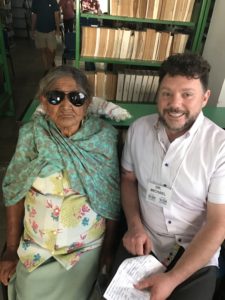
“Being respectful of our individual patients has always been a priority for VOSH. In keeping with the WHO recommendations, we need to continue to focus on making the provision of vision and eye care people centric. This involves including the local communities in decisions on what and how eye care is provided”
The year 2021 is VOSH’s 50th year anniversary, having been established in 1971. VOSH has undergone a lot of change since its inception. From a Kansas Chapter of 5 male ODS in 1971 to a global organization of over 90 chapters worldwide, recipients of major global grants and funding, the formation of valuable relationships with globally recognized healthcare organizations, and a strong movement towards developing a sustainable system of eye care, bolstered by the VOSH’s role in the establishment of optometry schools in countries where such education is lacking.
How do you see the organization changing in two years, and how do you see yourself creating that change?
Determining when we can return to humanitarian clinics will require even more cooperation with local organizations than ever before; SVOSH chapters, local optometry and ophthalmology providers and groups, host organizations etc, It has always been important to involve the people and the community we are caring for in the decisions on what care to provide and how, but deciding when we can provide care while keeping everyone safe, volunteers and patients alike will vary from region to region (vaccination rates vary etc).
Due to social distancing requirements and safety protocols, the way that we structure our clinics will need to be modified. It may not be possible for us to see as many patients per day because it is not safe for them to be crowded into small spaces. We may need to implement scheduling protocols; people with blue tickets arrive at 8:00 am, people with orange tickets at 10:00 am etc. The upside of smaller clinics with fewer patients seen is that it gives us the opportunity to provide more education and training to our ODs and student ODs.
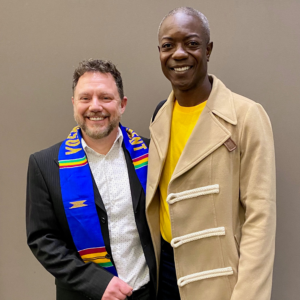
What are your top priorities as incoming president?
Over the last several years, there has been increased participation and cooperation with our student chapters and our international chapters. This inclusion has brought tremendous energy and opportunity to improve programs. I would like to see this chapter participation both with VOSH/International and inter-chapter collaboration continue to evolve.
Being respectful of our individual patients has always been a priority for VOSH. In keeping with the WHO recommendations, we need to continue to focus on making the provision of vision and eye care people centric. This involves including the community in decisions on what care is provided and how. Our goal is to eradicate blindness due to URE. Making sure that our humanitarian clinics support, rather than supplant, local efforts is the best way to make sure that care is continued and sustainable. Working within local health guidelines, trying to source medications and supplies as locally as possible and training local students and optometrists, while at the same time providing care, will have a much wider and longer impact. As the first openly LGBTQ president of VOSH/International, inclusion and diversity training is both important and personal. In addition to understanding a person’s culture and language, treating each patient we care for, and every volunteer we interact with, with respect is a primary goal.
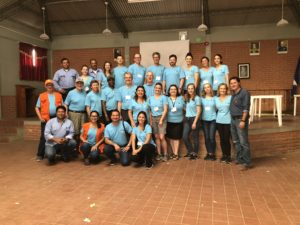
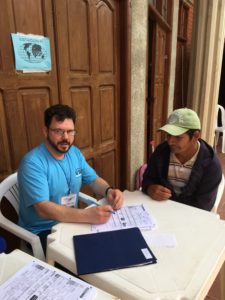
You have served in as the chair of the Student VOSH Committee for many years and have made major changes in the way in which the SVOSH chapters interact with VOSH/INT. For example, you oped communications between add among the SVOSH chapters, you organized in person symposiums (before COVID), you developed educational seminars and presentations to the school chapters. Why is this so important to you?
Working with the SVOSH chapters and SVOSH members is a tremendous joy. The students are eager to be part of the process and part of the solution. They are often able to view an issue from a unique perspective and therefore offer innovative solutions. The SVOSH members are the ones who will make sure we continue to adapt, innovate and improve.
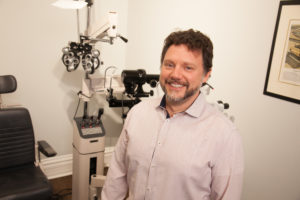
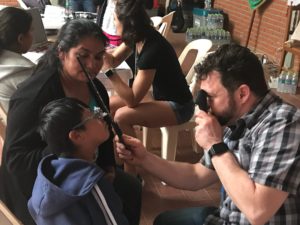
You have said that the collection and development of data gathering will be an important goal for you. That’s not an easy task to undertake, given the diverse nature of VOSH’s disparate and diverse organization , i.e. that VOSH/INT can not mandate to the chapters. Why have you chosen this as an important goal and what do you have in mind to make this a successful endeavor?
In order to be part of the planning and implementation for providing vision and eye health to people worldwide and addressing blindness due to uncorrected refractive error, we must be able to document our successes; we should be eager to document our successes. Collecting and reporting data highlights the important work our chapters and members are doing.
We are supporting our SVOSH chapters in Nicaragua, Peru and Mexico in their efforts to develop best practices protocols for school screenings which can then be replicated in other countries. This will have a lasting, widespread impact on the eye health and vision for generations of children and that success will underscore to governments and organizations the importance of providing eye care and vision to everyone.
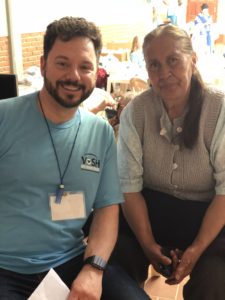
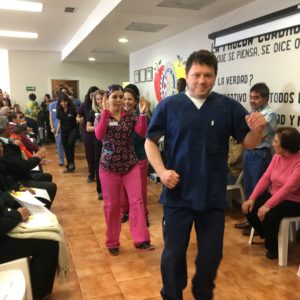
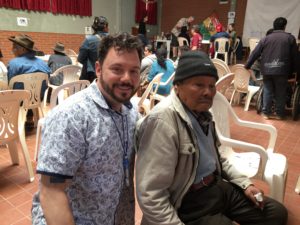
You own a busy optometric practice, you teach occasionally, you mentor an intern from ICO at your office, and you organize local clinics and have participated in many VOSH/International clinics. On a personal level, you study spanish, you are married, you work out, you ride motorcycles and more! With such a full and busy life, why did you accept the office of VOSH/INT presidency, knowing it would consume a lot of your public and private lives?
Often, when I talk about working with VOSH, people respond by saying, oh, what a wonderful thing you are doing. I thank them, but then tell them that I get so much more out of it than I put in. The lifelong friendships with amazing people I would otherwise never have met, the camaraderie with other volunteers, the skills I have learned, the opportunity to work together with my husband, getting to know new people in new places, being able to combine two of my passions, eye care and Spanish and much more, make working with VOSH so incredibly rewarding. I have much respect and awe for all of those who have made VOSH so extraordinary and hope to be able to be a small part of the continued impact.
